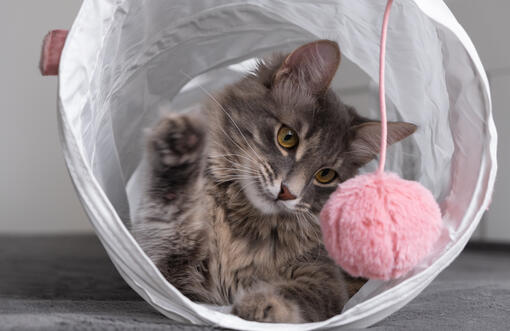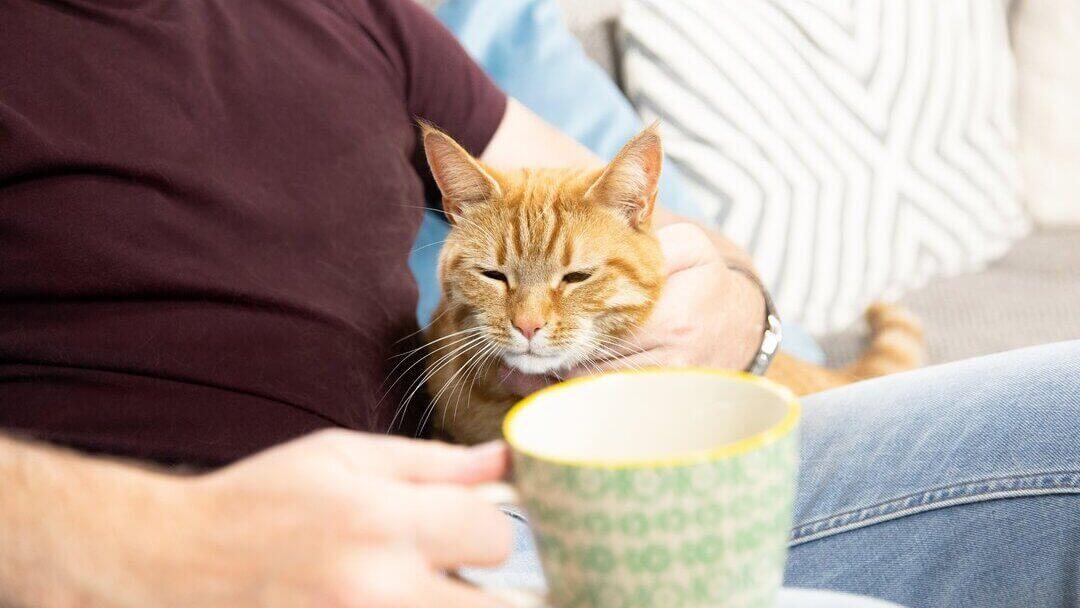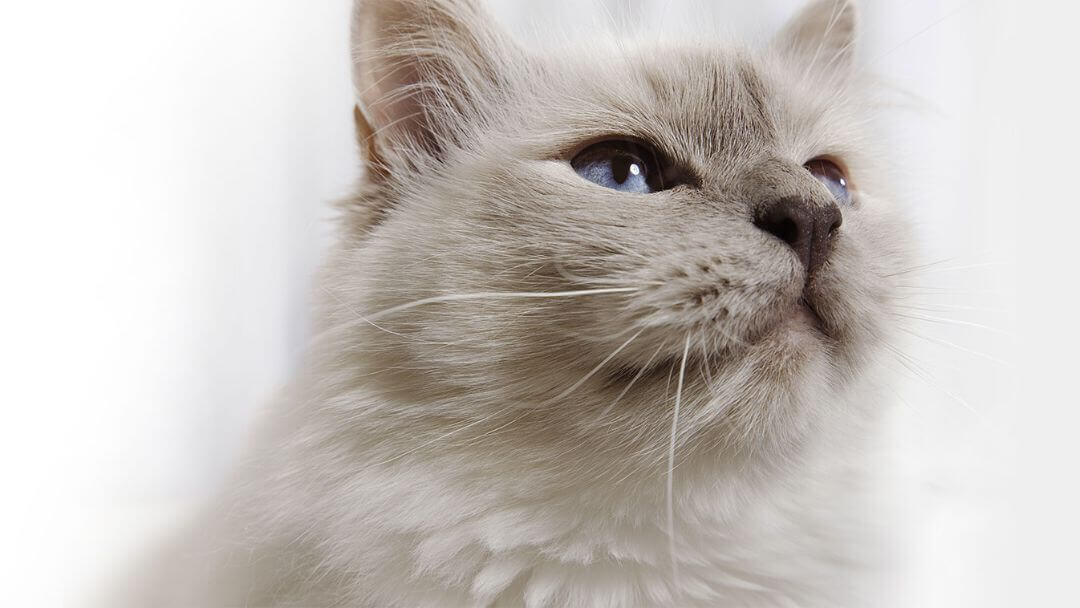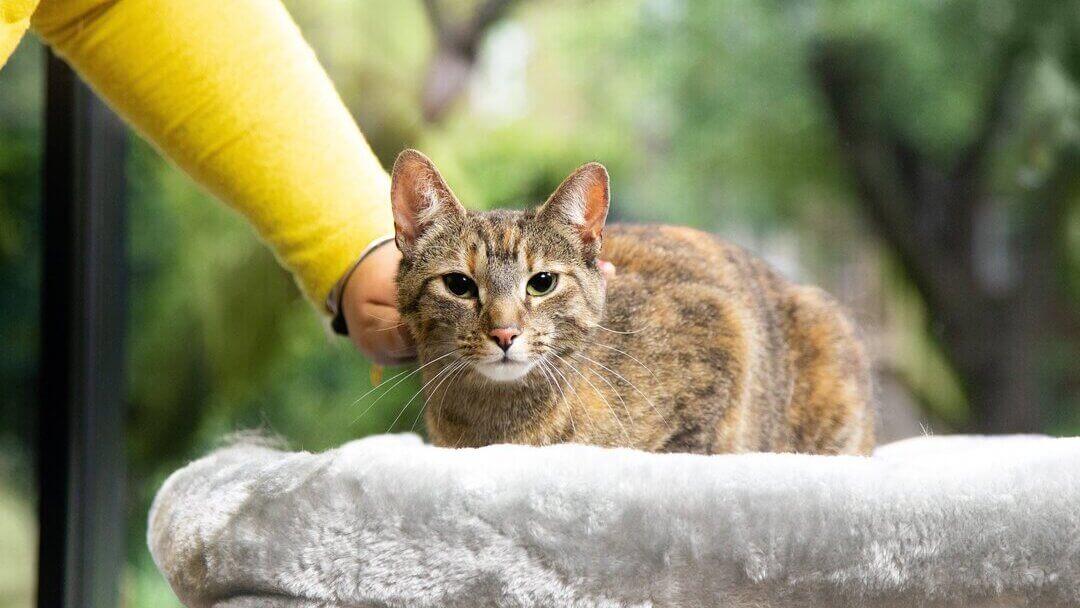Keeping Your Senior Cat Happy and Healthy: Exercise & Mental Stimulation
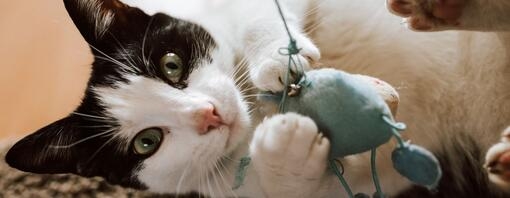
As cats get older, their needs change. Around the age of eleven, it’s time to adjust how you care for them to ensure they stay healthy and happy. While older cats may naturally become less active, keeping them stimulated and engaged is crucial for their wellbeing. This guide offers tips on how to include appropriate enrichment in their day to day lives, and how to set up their space to keep elderly cats comfortable and active.
It's important to remember that every cat is different. Some older cats may remain active and playful, while others will prefer a more relaxed lifestyle. The key is to observe your older cat's behaviour and adjust your care accordingly. With a little knowledge and a lot of love, you can provide a comfortable and fulfilling life for your cat whatever their age.
Why senior cats need exercise and mental stimulation
Senior cats need to keep their bodies moving and their minds active as they get older. Although they may have a tendency to sleep more and aren’t as playful as they were as a kitten, it's good for them to still play and they need age-appropriate enrichment.
Exercise helps them stay at a healthy weight and keeps their muscles strong. Mental stimulation, like puzzles, new toys or changes to their environment, helps keep their brains sharp and can prevent boredom. Without enough stimulation, cats can become bored, depressed and even develop behavioural issues. That's why it's important to provide them with toys, playtime, and a variety of activities to keep their minds and bodies active.
How do you mentally stimulate an old cat?
Mental stimulation is important for older cats. Just like humans, cats can experience cognitive decline as they age. Engaging their minds helps prevent boredom, reduces stress, and can even slow down the ageing process. Mental stimulation can also improve their mood and overall quality of life. Here’s how:
Sharper minds: Cognitive enrichment for senior cats
Similar to humans, cats may experience cognitive decline as they age. This condition, often referred to as Feline Cognitive Dysfunction (FCD) also known as Cat Dementia, can manifest as changes in memory, behaviour, and spatial awareness. Symptoms may include disorientation, confusion, decreased interaction, and changes in sleep patterns and toileting. While there's no cure for FCD, mental stimulation may slow the onset and can significantly improve a cat's quality of life. Engaging in activities that challenge their minds, such as puzzle feeders, interactive toys, or learning new tricks, can help slow the progression of cognitive decline and enhance overall well-being. It is important however that all of these new puzzles allow your cat the chance to ‘succeed’ – so they should be easy and well within your cat’s capabilities. Ensure you avoid toys or games where your cat can’t ‘catch’ the things you encourage them to chase (like laser pointers). This just produces frustration which is counter-productive.
Help Your Cat Maintain A Healthy Weight
Maintaining a healthy weight is crucial for elderly cats. As cats age, their metabolism slows down, making weight management more challenging and means it’s easier for them to gain weight. This can lead to health issues such as diabetes, joint problems, and heart disease. Gentle exercise can help older cats stay fit and healthy.
It's important to monitor your cat's weight regularly. If you notice any changes, consult with your vet. They can provide guidance on appropriate diet and exercise plans. Additionally, creating a stimulating environment can encourage activity. Providing opportunities for climbing, exploring, and playtime can help burn calories and keep your cat engaged.
Remember, gradual weight loss is the safest and healthiest approach. Avoid drastic dietary changes or excessive exercise without veterinary approval.
Happier older cat: Importance of emotional wellbeing
Playtime is essential for both the cat and owner. Beyond enjoyment, it strengthens the bond between pet and person. Just like us, cats feel happier and more content when they get to play and stay active, even as they get older. These shared experiences create positive associations and foster a deeper connection. By engaging in playful activities, owners can provide much-needed exercise and mental stimulation, contributing to their cat's overall quality of life. As your cat ages, these games need to be gentler and not involve much in the way of jumping, leaping or sudden turns.
Keeping your older cat moving
Encouraging physical activity in elderly cats can be challenging so getting your older cat moving might require some creativity. To help inspire you, here are some ideas:
What do senior cats like to play with?
Playtime is important for older cats. Even if they prefer to relax, short periods of interactive play can be beneficial. Cat toys like feather wands or mice can stimulate their natural instincts and help them stay active. It's essential to watch your cat carefully during playtime and adjust the activity level based on their energy to avoid tiring them out. Keep games short and gentle.
Creating an Active Playground
Provide a stimulating environment for your senior cat. Even if they are less active, providing opportunities for exercise and mental stimulation is important. Cat trees and scratching posts offer excellent opportunities for climbing and stretching, helping to maintain muscle strength and flexibility. Additionally, turning mealtime into a game with puzzle feeders or hidden treats can keep your cat engaged and mentally alert, essential for maintaining their overall wellbeing.
Enrichment isn’t always about games and play. Sometimes giving them lookout places where they can rest comfortably and watch what is going on out of the window can be just an enriching as a chase game.
Creating a Senior-Friendly Home Environment
A well-designed living space can significantly enhance a senior cat's quality of life. As cats age, they may experience physical limitations that require adjustments to their environment.
- Provide easy access: Ensure your cat can easily reach senior cat food, water, litter boxes, and favourite resting spots without stairs or excessive jumping. Put down extra water bowls in every room your cat spends time in, as dehydration can become an issue in cats who become more reluctant to move as they age.
- Create quiet spaces: Designate quiet areas for your cat to retreat and relax.
- Maintain cleanliness: Regular cleaning helps prevent slips and falls, especially for cats with arthritis. Put rugs or mats down on slippery floors (tape them down so they are not a hazard for either of you!).
- Provide a comfortable place for your cat to ‘supervise’ your day-to-day activities in every room you/they spend time in.
- Consider additional comfort: Orthopaedic beds, heated pads, or joint supplements can provide relief for older cats.
By creating a safe and comfortable environment, you can help your senior cat maintain independence and mobility.
Safe Outdoor Fun
Outdoor stimulation can benefit older cats. A secure outdoor space, such as a catio or a cat-proof fenced garden, allows for safe exploration and sensory enrichment for senior cats. Even brief periods outdoors can improve mood and overall wellbeing. If your cat is trained to be happy in a harness and lead (and is happy about it!), you can give them short trips outside while keeping them safe and close to you.
How to help a bored senior cat?
Cats can easily become bored, just like us. To keep them entertained and mentally stimulated, it's essential to rotate their toys regularly. Puzzle feeders and treat-dispensing toys are excellent options for engaging their minds. These interactive toys provide both mental and physical exercise, preventing boredom and promoting overall wellbeing. Remember however that toys are not interesting to adult cats if they just sit there! They are only fun if you play with them and make them ‘come to life’. Just having lots of toys will not stimulate any cat unless you play with them. Ageing cats may have quietened down but they need even more social contact form you to remain active.
Brain Games & Training
As our cats get older, it's more important than ever to make sure they're living their best lives. Just like us, they need love, care, and plenty of opportunities to stay active and engaged. Making positive changes to their environment, introducing new toys and gentle games, and spending more time with them can transform their lives as they age.
By making a little extra effort to keep their minds sharp and their bodies moving, we can make sure they are living a fulfilled life. After all, our cats are family, and they deserve all the love and happiness we can give them.
Understanding your cat's individual needs is crucial. While this guide provides general advice, it's essential to observe your cat's behaviour and consult with your veterinarian for personalised recommendations or if you see any sudden changes in behaviour. By combining love, patience, and a proactive approach, you can create a happy and healthy environment for your senior cat.
Remember, small changes can make a big difference to having a happy healthy older cat.

